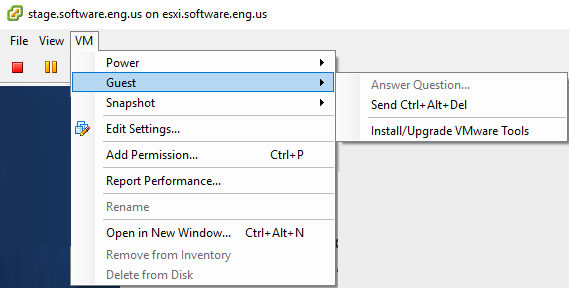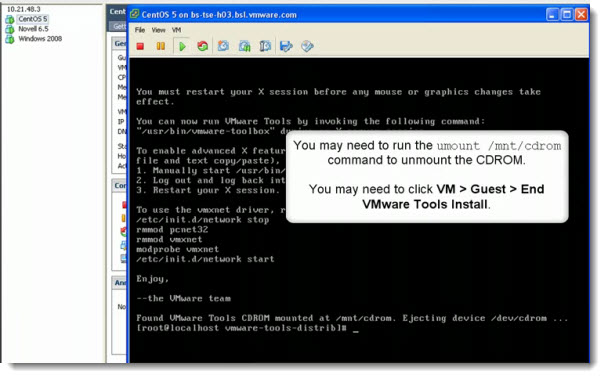
Vmware tools linux iso download - opinion
vmware / open-vm-tools
What is the open-vm-tools project?
open-vm-tools is a set of services and modules that enable several features in VMware products for better management of, and seamless user interactions with, guests. It includes kernel modules for enhancing the performance of virtual machines running Linux or other VMware supported Unix like guest operating systems.
open-vm-tools enables the following features in VMware products:
- The ability to perform virtual machine power operations gracefully.
- Execution of VMware provided or user configured scripts in guests during various power operations.
- The ability to run programs, commands and file system operation in guests to enhance guest automation.
- Authentication for guest operations.
- Periodic collection of network, disk, and memory usage information from the guest.
- Generation of heartbeat from guests to hosts so VMware's HA solution can determine guests' availability.
- Clock synchronization between guests and hosts or client desktops.
- Quiescing guest file systems to allow hosts to capture file-system-consistent guest snapshots.
- Execution of pre-freeze and post-thaw scripts while quiescing guest file systems.
- The ability to customize guest operating systems immediately after powering on virtual machines.
- Enabling shared folders between host and guest file systems on VMware Workstation and VMware Fusion.
- Copying and pasting text, graphics, and files between guests and hosts or client desktops.
Can you provide more details on the actual code being released?
The following components have been released as open source software:
- Linux, Solaris and FreeBSD drivers for various devices and file system access.
- The memory balloon driver for reclaiming memory from guests.
- The PowerOps plugin to perform graceful power operation and run power scripts.
- The VIX plugin to run programs and commands, and perform file system operations in guests.
- The GuestInfo plugin to periodically collect various statistics from guests.
- The TimeSync plugin to perform time synchronization.
- The dndcp plugin to support drag and drop, and text and file copy/paste operations.
- The ResolutionSet plugin to adjust guest screen resolutions automatically based on window sizes.
- The guest authentication service.
- The toolbox command to perform disk wiping and shrinking, manage power scripts, and time synchronization.
- The guest SDK libraries to provide information about virtual machines to guests.
- Clients and servers for shared folders support.
- Multiple monitor support.
- The GTK Toolbox UI.
Is open-vm-tools available with Linux distributions?
Yes. open-vm-tools packages for user space components are available with new versions of major Linux distributions, and are installed as part of the OS installation in several cases. Please refer to VMware KB article vtigerxabier.esy.es for details. All leading Linux vendors support open-vm-tools and bundle it with their products. For information about OS compatibility for open-vm-tools, see the VMware Compatibility Guide at vtigerxabier.esy.es Automatic installation of open-vm-tools along with the OS installation eliminates the need to separately install open-vm-tools in guests. If open-vm-tools is not installed automatically, you may be able to manually install it from the guest OS vendor's public repository. Installing open-vm-tools from the Linux vendor's repository reduces virtual machine downtime because future updates to open-vm-tools are included with the OS maintenance patches and updates. NOTE: Most of the Linux distributions ship two or more open-vm-tools packages. "open-vm-tools" is the core package without any dependencies on X libraries and "open-vm-tools-desktop" is an additional package with dependencies on "open-vm-tools" core package and X libraries. The "open-vm-tools-sdmp" package contains a plugin for Service Discovery. There may be additional packages, please refer to the documentation of the OS vendor. Note that the open-vm-tools packages available with Linux distributions do not include Linux drivers because Linux drivers are available as part of Linux kernel itself. Linux kernel versions and later include all of the Linux drivers present in open-vm-tools except the vmhgfs driver. The vmhgfs driver was required for enabling shared folders feature, but is superseded by vmhgfs-fuse which does not require a kernel driver.
Will there be continued support for VMware Tools and OSP?
VMware Tools will continue to be available under a commercial license. It is recommended that open-vm-tools be used for the Linux distributions where open-vm-tools is available. VMware will not provide OSPs for operating systems where open-vm-tools is available.
How does this benefit other open source projects?
Under the terms of the GPL, open source community members are able to use the open-vm-tools code to develop their own applications, extend it, and contribute to the community. They can also incorporate some or all of the code into their projects, provided they comply with the terms of the GPL.
What license is the code being released under?
The code is being released under GPL v2 and GPL v2 compatible licenses. To be more specific, the Linux kernel modules are being released under the GPL v2, while almost all of the user level components are being released under the LGPL v The SVGA and mouse drivers have been available under the X11 license for quite some time. There are certain third party components released under BSD style licenses, to which VMware has in some cases contributed, and will continue to distribute with open-vm-tools.
Why did you choose these licenses?
We chose the GPL v2 for the kernel components to be consistent with the Linux kernel's license. We chose the LGPL v for the user level components because some of the code is implemented as shared libraries and we do not wish to restrict proprietary code from linking against those libraries. For consistency, we decided to license the rest of the userlevel code under the LGPL v as well.
What are the obligations that the license(s) impose?
Each of these licenses have different obligations. For questions about the GPL, LGPL licenses, the Free Software Foundation's GPL FAQ page provides lots of useful information. For questions about the other licenses like the X11, BSD licenses, the Open Source Initiative has numerous useful resources including mailing lists. The Software Freedom Law Center provides legal expertise and consulting for free and open source software (FOSS) developers.
Can I use all or part of this code in my proprietary software? Do I have to release the source code if I do?
Different open source licenses have different requirements regarding the release of source code. Since the code is being released under various open source licenses, you will need to comply with the terms of the corresponding licenses.
Am I required to contribute back any changes I make to the code?
No, you aren't required to contribute any changes that you make back to the open-vm-tools project. However, we encourage you to do so.


-
-
-